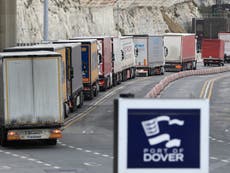Brexit is hurting the UK’s productivity – and wages with it
Uncertainty over Britain’s departure from the EU has led firms to hold back investment. And if their sales drop when we leave, we can expect heavy layoffs


The statement published by the Bank of England last week, alongside its decision to keep interest rates unchanged (no surprises there), contained this line: “Productivity growth appeared to have weakened further so far this year.” That’s a rather more ominous announcement than it might sound.
Labour productivity – commonly measured as GDP per hour worked – isn’t just a concept for economists to obsess about. If workers are more productive, firms can afford to pay them more.
While UK productivity has risen substantially since at least the post-Second World War years, it has flatlined since the financial crisis. The latest official data, covering the first three months of this year, shows that productivity in fact fell 0.2 per cent compared with a year earlier. And the Bank of England chalks the problem up to one main culprit: Brexit.
In a paper published last month, the bank even puts a number on the Brexit effect: it estimates that over the past three years, the drawn-out process of leaving the EU has reduced UK productivity by between 2 and 5 per cent.
But it’s not just the uncertainty about what Brexit will look like and when it’ll happen. There are reasons to think that even once we part ways with the EU, weakness in productivity may persist.
So how exactly is Brexit affecting productivity? One explanation given by the central bank is the hugely complex business of Brexit planning, which is taking up top managers’ time – time that would otherwise be spent on raising output and productivity.
The bank’s survey of thousands of firms found that between November 2018 and January 2019, more than 70 per cent of chief executives and chief financial officers (CFOs) dedicated “some time” each week to Brexit preparations, with 6 per cent of CEOs and 10 per cent of CFOs giving it six hours or more of their time.
Secondly, companies have become reluctant to invest. Research by the Bank of England found that anticipation of Brexit has gradually cut UK investment by about 11 per cent over the past three years. Without clarity about when and how Britain’s EU membership will end and what kind of trade deal will eventually replace it, they cannot be assured of their future profits – or in some cases, of their very survival.
That in turn can see them decline to spend on better equipment and software – things that improve efficiency in the long run, but which can be hard to justify if firms are unsure there will be enough people buying their efficiently produced goods and services.
What’s more, by not investing, some firms may have been unable to improve their products and therefore lost customers to competitors. And it may be too late to use investment to catch up. As the bank’s governor Mark Carney said in August, for some of those companies, “the opportunity has been lost”.
More worryingly, some firms are not investing for fear of a no-deal Brexit, some of them preparing to abandon certain business lines or leave the UK altogether. Carney warned last month that if we crash out of the EU, business closures are likely, as certain activities involving trade with the bloc will simply become uneconomic.
Indeed, the Bank of England found that Brexit uncertainty has reduced activity – and productivity – at EU-exposed firms in particular. It might be that EU companies have already started switching suppliers away from UK exporters to avoid disruption if trade barriers go up. And British exporters tend to be more productive than domestically focused firms, so a hit to their efficiency has bigger national implications.
An earlier paper by the central bank uncovered evidence for a shift highlighted by many other commentators: firms are increasingly hiring rather than investing. The logic is that if sales drop, they can save money by firing workers; investment in machinery is a more permanent expense. If the relative strength of the UK labour market since the EU referendum is built on investment in hiring at the expense of efficiency, there may be serious trouble ahead.
At the same time, Brexit has already reduced the supply of skilled EU workers in some sectors. And as CIPD, the professional UK body for HR specialists, recently pointed out, the inflow of EU workers will fall further once new immigration restrictions are in place.
Some of the Brexit-related slowdown will inevitably be temporary, but even a temporary rough patch should be cause for alarm. Any period of sluggish productivity growth, or no growth at all, is likely to lower wages relative to what they would otherwise have been.
And it matters for the broader economy too. Like a delayed train that must accelerate to reach its destinations on schedule, GDP that’s growing too slowly may forever be years behind where it would have been had we never voted Leave.




Join our commenting forum
Join thought-provoking conversations, follow other Independent readers and see their replies